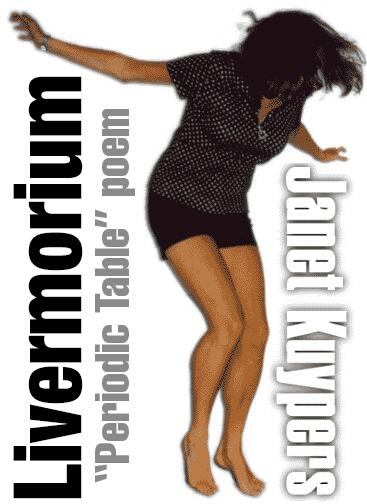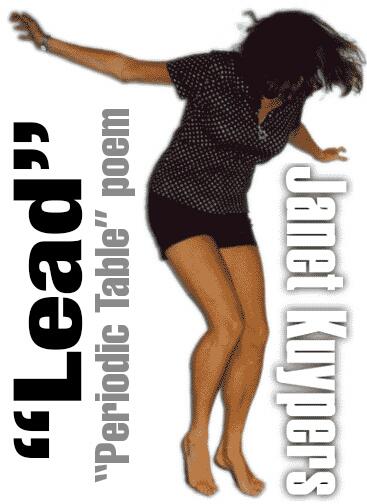poem
Livermorium, Periodic Table of Poetry poem by Chicago poet Janet Kuypers
Livermorium
by Janet Kuypers

from the “ Periodic Table of Poetry” series (#116, Lv; Ununhexium, eka-polonium)
For so many years,
you’ve gone by another name,
and then you seem surprised
when people don’t know who you are.
You’ve wanted to be known,
and I’ve known you for years,
but I’ve noticed that as time passes,
as you grow,
you move farther
and farther
away.
You’ve tried for so long,
and over the years,
in our efforts to synthesize
we’ve had some successful reactions,
some failures to react —
and I know that some attempts
have not even been made,
but at times these attempts at fusion with you
seem far too hot for me to handle.
And really,
I assume
they’re too hot
for you too.
Maybe your half life is just so short
that I never know what to do with you.
And I’ll never know what you’ll do next.
In our past four creations,
this quantum tunneling
has been something
I don’t think I can take any longer.
And I’m sorry, but
you’re insufficiently stable,
and you’ve never let me confirm
the true weightiness of your soul.
So,
maybe you should go your way,
and I should go mine.
I know your possible chemistry,
and I know you want to share your soul
with the entire world.
I know this.
And I’m sorry,
but I’ve grown tired,
and know
you’ll continue to grow without me.
So yes,
you should go your way,
and I should go mine.
Maybe one day,
you will truly find
what you —
and the world —
so desperately needs.
Lead, periodic table poem from Chicago poet Janet Kuypers
Lead
by Janet Kuypers

from the “ Periodic Table of Poetry” series (#082, Pb)
I walked into the bedroom,
opened the closet door,
pulled out the cardboard box,
then opened it to pull out
a pistol case.
I set the piston case down,
opened it,
saw the unloaded twenty-two
and the filled magazine.
I held the magazine
filled with Lead bullets,
reminding myself
that it was always an option.
There’s so much more weight
in those Lead bullets.
They feel heavy in my hand.
Then again,
Lead aprons to protect you from x-rays
are heavy, too.
Lead is so common,
used for thousands of years,
from the Bronze Age,
pushing the Roman economy.
The name for plumbing
even comes from the Latin
“plumbum” because
Lead pipes were used.
And after all these years,
Lead’s not even used
in lead pencils,
that writing stylus
is just a lead mockup. . .
Because Lead comes
from the decay of uranium,
and sometimes could be radioactive,
but still, it can protect you
from things like x-rays
or even nuclear contamination.
So yeah, it can protect you,
and it can also be the missile
in an instrument of death.
As I said,
These bullets
feel so heavy
in my hands.
Molybdenum, Periodic Table poem by Janet Kuypers
Molybdenum
Janet Kuypers
from the “ Periodic Table of Poetry” series (#035;042, Mo)
I love this country.
We should protect our rights.
Gotta love
our military-
industrial
complex.
We gotta protect ourselves —
I’ll use everything I can
to be the one on top.
I know I’ve used you,
but it was wartime,
you gotta understand.
You gave me speed,
You were light on your feet,
but stiff as a board.
When things got hot,
you stood up to anything.
and I liked flexing my muscles with you.
I know it was wartime,
but I would have
made a Japanese sword outa you,
if I coulda put you together right.
And I know, I know,
you say I need you
for all my amino acids
to keep my innerds running,
but I’m still on my war-kick here,
‘cause when it’s war time,
that’s when I need you most.
People say that war’s no good,
but I say
you’re the meaning of life.
I love the U. S. of A.,
and with you by my side,
we can shove a boot up their ass —
it’s the American way.
